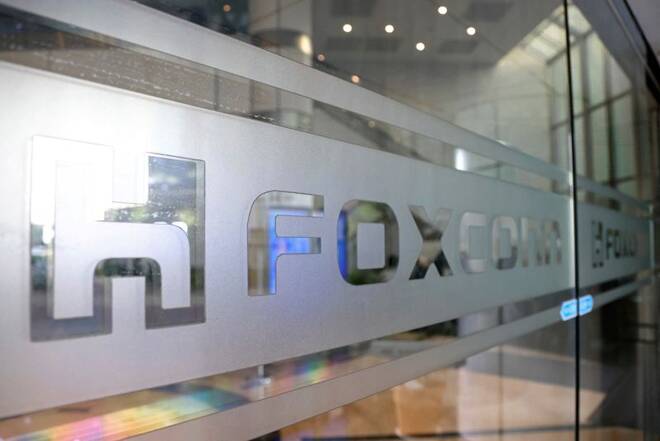Advertisement
Advertisement
Chinese cities brace for wave of Foxconn workers from COVID-hit Zhengzhou
By:
BEIJING (Reuters) - Cities in central China hastily drew up plans to isolate migrant workers fleeing to their hometowns from a vast assembly facility of iPhone maker Foxconn in COVID-hit Zhengzhou city, fearing the returnees may trigger coronavirus outbreaks.
By Ryan Woo and Ziyi Tang
BEIJING (Reuters) – Cities in central China hastily drew up plans to isolate migrant workers fleeing to their hometowns from a vast assembly facility of iPhone maker Foxconn in COVID-hit Zhengzhou, fearing they could trigger coronavirus outbreaks.
Zhengzhou, capital of central Henan province, reported 167 locally transmitted COVID-19 cases in the seven days to Oct. 29, up from 97 infections in the prior seven-day period.
Apple supplier Foxconn, based in Taiwan, currently has about 200,000 workers at its Zhengzhou complex and has not disclosed the number of infected workers, but said on Sunday that it would not stop workers from leaving.
Late on Saturday, cities near Zhengzhou, including Yuzhou, Changge and Qinyang, urged Foxconn workers to report to local authorities in advance before heading home.
Returning workers are to travel “point-to-point” in pre-arranged vehicles and are to be quarantined on arrival, they said in separate letters on their respective social media accounts addressed to Zhengzhou Foxconn workers.
Under China’s ultra-strict zero-COVID policy, cities are mandated to act swiftly to quell any outbreaks, with measures that could include full-scale lockdowns. On Oct. 19, Foxconn banned all dine-in at canteens and required workers to take their meals in their dormitories.
“The government agreed to resume dine-in meals to improve the convenience and satisfaction of employees’ lives,” Foxconn told Reuters in an emailed reply to queries on Sunday.
“At the same time, for some employees who want to return home, the (plant) is cooperating with the government to organise personnel and vehicles to provide a point-to-point orderly return service for employees from today.”
Disruptions from China’s COVID policies to commerce and industry have intensified in recent weeks as cases multiplied. Shanghai Disneyland said on Saturday it would operate at reduced capacity. On Wednesday, Universal Beijing Resort was suspended after the visit of one infected individual.
“We are very aware that under the current situation, it is a protracted battle,” Foxconn said.
But the situation was gradually coming under control, it said, and Foxconn would coordinate back-up production capacity with its other plants to reduce any potential impact.
Apple did not immediately reply to a Reuters request for comment on the Foxconn situation.
‘I COULDN’T HELP BUT FEEL SAD’
Foxconn did not respond to Reuters questions on how many cases had been detected at its Zhengzhou plant and how many workers had left.
Photographs and videos circulating on Chinese social media since Saturday showed Foxconn workers, apparently returning home, trekking across fields in the day and along roads at night. Reuters could not immediately verify the authenticity of the posts.
In a show of support, residents in the vicinity left bottled water and provisions next to roads with signs such as: “For Foxconn workers returning home”, according to social media posts.
“Some people were walking amid wheat fields with their luggage, blankets and quilts,” wrote a user of WeChat in a post about the social media images.
“I couldn’t help but feel sad.”
(Reporting by Ryan Woo and Ziyi Tang; Editing by Edmund Klamann and Nick Macfie)
About the Author
Reuterscontributor
Reuters, the news and media division of Thomson Reuters, is the world’s largest international multimedia news provider reaching more than one billion people every day. Reuters provides trusted business, financial, national, and international news to professionals via Thomson Reuters desktops, the world's media organizations, and directly to consumers at Reuters.com and via Reuters TV. Learn more about Thomson Reuters products:
Did you find this article useful?
Latest news and analysis
Advertisement
